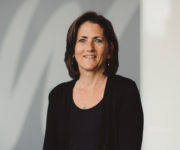Meet the Match
A Palestinian Woman Advocates for Gender Equality through Sports
It had been years since Malak Hasan had pedaled a bicycle.
When she was 13 years old, her parents left the United Arab Emirates, where Malak was born and enjoyed a childhood full of activities like karate and swimming. The family moved to the small village of Biddu in the Palestinian Territories, a place where sports facilities for women were non-existent and even water and electricity were privileges. When she saw the green bicycle in the shop window during her time studying overseas in Wales, it brought her back to those earlier years. So, she bought it right there on the spot.
“I Skyped my family and told them I was planning to exercise every day,” Malak said. “By the end of the year, I was cycling 20 to 30 miles. I kept my promise.”
After finishing her master’s degree in communications, media practice and public relations from Swansea University, Malak returned to her country a changed woman. She took a job as chief correspondent for The Arab Weekly newspaper. Then, one day, she took her first steps into the boxing gym.
Boxing is a long way from cycling, and not what many in her community would expect for a woman. But in this tough environment, Malak found a place to challenge ideas about gender norms.
“When I first walked into the gym, I was the only girl,” Malak stated. “The coaches asked me, ‘Why do you want to do this?’ I asked them if they asked boys the same question.’ After that, they just let me box.”
In the gym, Malak met an 11-year-old girl named Zaina. As she watch her hit the punching bag and work on drills in the corner, she saw the change that women like her can make for girls across the Palestinian Territories. With a lack of female role models, it is very challenging for girls to believe they have a future in sports. One of the country’s female Olympians, Woroud Sawalha, who Malak tried to interview for a story after she participated in the 2012 London Olympics, was largely forgotten after she did not medal.
“For our society, the story of Woroud shows the struggle all women face,” Malak said. “You either win or you’re forgotten. But, girls need role models.”
Now, Malak is embracing her own potential as a sports leader. She receives emails and messages from girls who have heard about her cycling on weekends in a headscarf, or running through drills with the boys at the boxing gym. At the urging of her boxing coach, she ran for and was elected as the youngest and first female general secretary of the Palestinian Boxing Federation. She is also a founding member of Cycling Palestine—an NGO devoted to promoting bicycling in the community, and serves as senior news editor for WAFA News Agency English.
“People always say women are weak, emotional, and incapable of making decisions,” Malak said, “but I’m showing you through sports that these stereotypes are not true. For me, sport is a symbol in society of whether women are oppressed or free. In order to have a liberated society anywhere women should be able to choose.”
A lack of resources and facilities prevent Palestinian women from having full access to sports. Women have limited participation in key sectors with only 13 percent holding positions in national parliament and 62 percent of women under 25 years old unemployed.
“We have a semblance of equality in Palestine, but the limited participation of women means this equality does not translate over to reality,” Malak said. “When you’re not represented by the system or in the institutions, your voice will not be heard. I believe sports is just as important as art, music, economics, policy, and if we can start to make an impact in the sports world, which is so dominated by men, then it will make an impact everywhere else.”
Already a prominent voice for gender equality, Malak regularly appears on radio and television shows. She is currently working on a documentary series, Palestine by Bike, documenting the stories of everyday Palestinians, with the hope that awareness and education will help to break down stereotypes and inequalities.
By participating in the U.S. Department of State and espnW Global Sports Mentoring Program, Malak has learned more about how she can use her platform as a female sports leader and journalist to promote gender equality and women’s empowerment. She is mentored by Diane Morse, chief counsel for ESPN. A more than 20-year veteran of working in legal affairs for the global sports media company, she shares key insights on leading as a female in a male-dominated sports world, and connects Malak with the technology, methodologies, and media practices for how to promote women’s sports in the Palestinian Territories.

